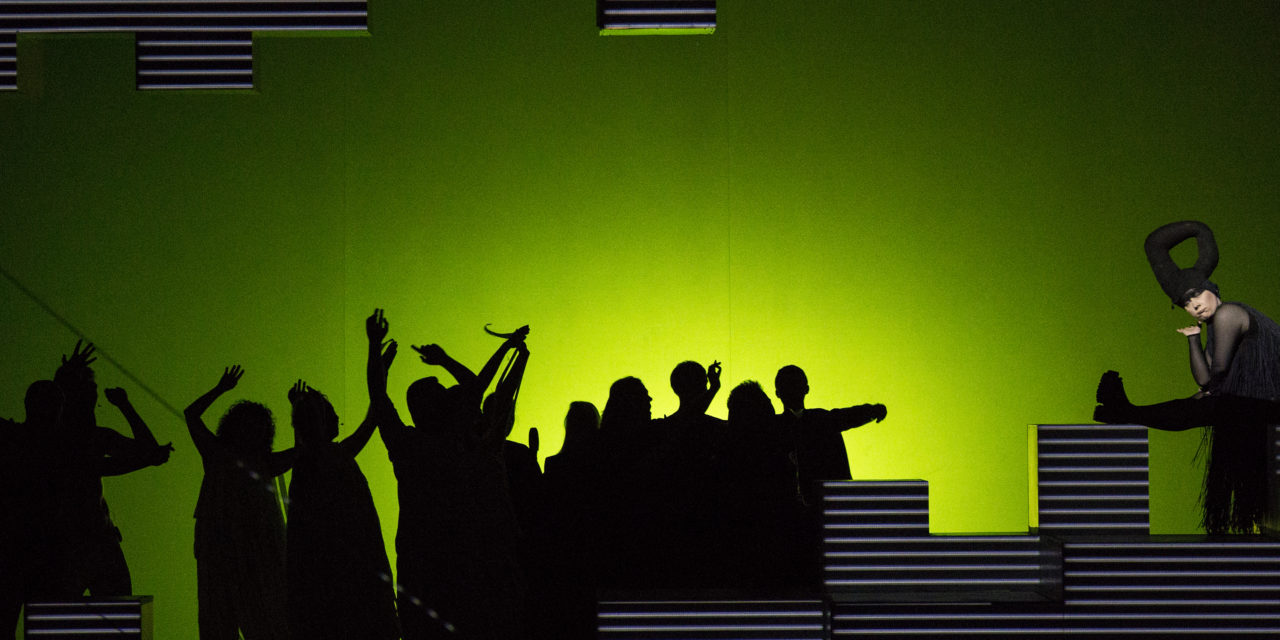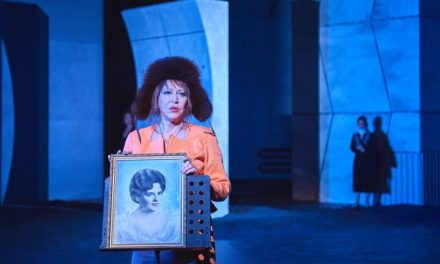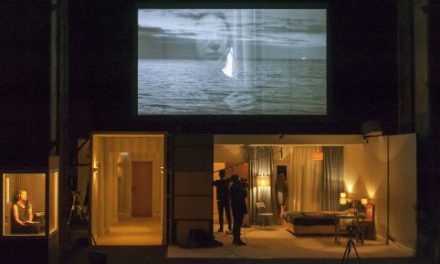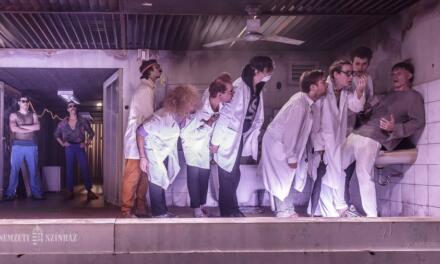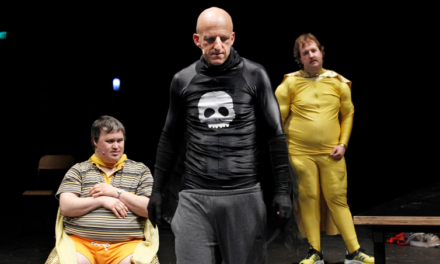“A long, long time ago…or maybe not so long ago…in fact, quite recently, there was a boy named Omar”–this is how Jolanta Góralczyk (as the National Conscience) opens Yemaya–Królowa Mórz [Yemaya–The Queen Of Seas], the Wrocław Puppet Theatre production about the refugee crisis aimed at audiences six years old and above. Throughout the next hour, children will build a relationship with Omar (the phenomenal Agata Kucińska) and experience a colorful adventure. Many of their parents and minders (and the current author) will struggle to hold their tears as they see a father (Igor Kujawski) waiting on a shore for his son who was taken by the sea. This image evokes the death of Alan Kurdî, a three-year-old Syrian boy who drowned in the Mediterranean Sea in September 2015. The picture of Alan Kurdî that made global headlines was a direct inspiration for Małgorzata Sikorska-Miszczuk to write the play. Resonating with audiences of all ages and raising issues that few theatres in Poland engaged with, Yemaya is a production that should be invited to all major theatre festivals, especially those aimed at young audiences.
Omar, Multilingualism, and Environment
Małgorzata Sikorska-Miszczuk, known internationally for her collaborations on the multilingual play Europa (2013), wrote a multi-layered play that Martyna Majewska staged with a great sense of empathy, playfulness, and theatre aesthetics. Yemaya tells a story of a five-year-old boy, Omar, who lives with his father. Omar loves daydreaming and talking to flowers, neither of which his father approves. One day, Omar wakes up and his city is gone, taken by the war. Omar and his father must escape on a boat over a big sea. During the journey, a wave washes Omar off the boat and he finds himself underneath the sea in the magical kingdom of Queen Yemaya (the superb Marta Kwiek). By the end of the show, Omar will have to decide whether to stay with Yemaya or return to his father.
![“Yemaya – Królowa Mórz” [“Yemaya – the Queen of Seas”], dir. by Martyna Majewska, Wrocławski Teatr Lalek, left to right: Grzegorz Borowski (Balcony), Grzegorz Mazoń (Shark Gogo), Agata Kucińska (Omar), Anna Bajer (Ray Manta). Photograph by Karol Krukowski.](https://thetheatretimes.com/wp-content/uploads/2018/02/fot-wtl_1920x1080_9744-900x600.jpg)
Yemaya–Królowa Mórz [Yemaya–The Queen Of Seas], dir. by Martyna Majewska, Wrocławski Teatr Lalek, left to right: Grzegorz Borowski (Balcony), Grzegorz Mazoń (Shark Gogo), Agata Kucińska (Omar), Anna Bajer (Ray Manta). Photograph by Karol Krukowski.
“We are all on the same boat…”
Music by Dawid Majewski (brother of Martyna) plays an important role in the production. As the world under the sea is filled with singing, it helps to balance Yemaya’s socio-political, entertainment, and aesthetic values. Majewski’s music is also a key signifier of the dramatic space, evoking the sounds of the sea and complementing Anna Haudek’s scenography. Haudek uses mostly white, black, and silver colors, supporting the parable quality of Yemaya, evoking the colors of the oceans, echoing the myths of Aleppo as the white city, and providing an ideal background for Jakub Lech’s multimedia projections.
![“Yemaya – Królowa Mórz” [“Yemaya – the Queen of Seas”], dir. by Martyna Majewska, Wrocławski Teatr Lalek, left to right: Sławomir Przepiórka (Dinosaur Molecule), Marta Kwiek (Yemaya), Agata Kucińska (Omar). Photograph by Karol Krukowski.](https://thetheatretimes.com/wp-content/uploads/2018/02/Yemaya9-900x600.jpg)
Yemaya–Królowa Mórz [Yemaya–The Queen Of Seas], dir. by Martyna Majewska, Wrocławski Teatr Lalek, left to right: Sławomir Przepiórka (Dinosaur Molecule), Marta Kwiek (Yemaya), Agata Kucińska (Omar). Photograph by Karol Krukowski.
“Masterclass” in Acting
The audience’s engagement with the story is enhanced by the highest-quality individual and ensemble acting. Marta Kwiek and Agata Kucińska deserve a special mention. The former metamorphoses into a being that cannot be simply described in human or animal terms. Her energy and voice fill the stage. Kucińska’s performance in Yemaya was described by the Polish critic Jacek Sieradzki as a “masterclass”. Watching her Omar, one forgets that one sees an adult woman. Her body, gestures, and voice transform into those of a shy and naive boy. As the production premiered when the theatre celebrated its 70th anniversary, it was a special touch to feature Anna Proszkowska’s voice as the Heart of the Ocean. Proszkowska is the legend of Polish puppetry theatre as an actor, director, and educator. She has trained generations of Polish puppeteers, including many of the actors featured in Yemaya. For many, she remains the heart of the Wrocław Puppet Theatre.
*All translations are provided by the author.
This post was written by the author in their personal capacity.The opinions expressed in this article are the author’s own and do not reflect the view of The Theatre Times, their staff or collaborators.
This post was written by Kasia Lech.
The views expressed here belong to the author and do not necessarily reflect our views and opinions.

